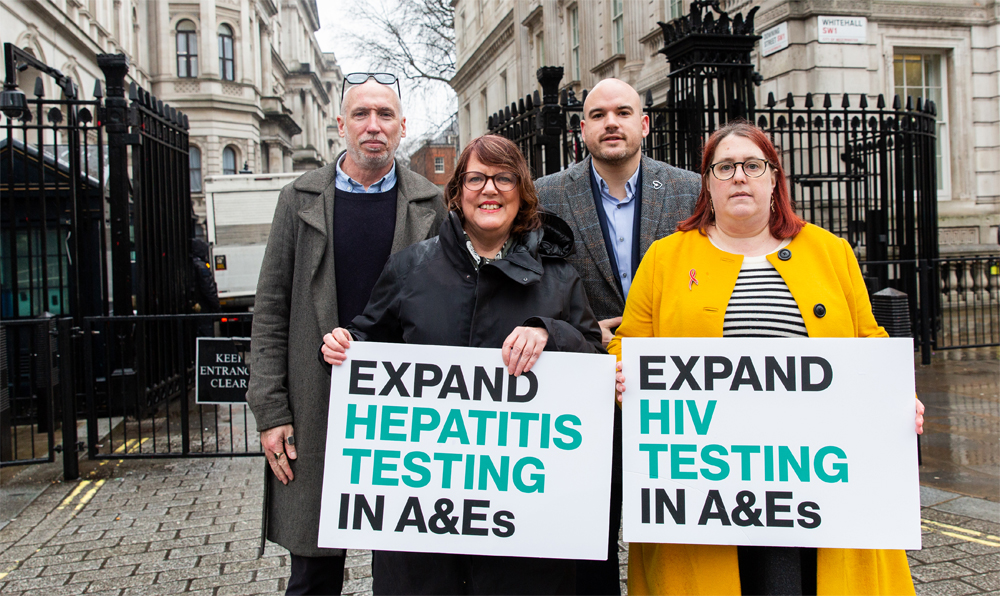
In December 2023, the government announced a £20 million new investment in opt-out HIV testing for 47 more A&Es across England.
In Scotland, the Scottish Government has committed to funding three short pilots of opt-out HIV testing in NHS Lothian, NHS Grampian and NHS Highland.
Terrence Higgins Trust’s incredible supporters helped to make this huge campaign win happen. Find out more about how we won this together here.
What is opt-out HIV testing?
The principle is simple – every time someone has their blood taken in a health service, they are tested for HIV unless they specifically ask not to be. This type of routine HIV testing has long happened in maternity services and helped to nearly eliminate vertical (mother to baby) transmission of HIV in the UK. In 2019, our friends at Elton John AIDS Foundation trialled it in A&Es and showed that it worked there too.
Opt-out HIV testing is recommended in national HIV testing guidelines: NICE recommend that in all areas with a high prevalence of HIV, it takes place in A&Es, as well as on registration at a GP service.
Thanks to our supporters and partners across the HIV sector, the UK Government has been funding opt-out HIV testing in A&Es in very high prevalence areas since April 2022. This funding for London, Brighton, Blackpool and Manchester continues until April 2025.
What have the results been?
In the first 18 months of opt-out HIV testing in England, nearly 1,000 people have been found with HIV. A third had been previously diagnosed but were not accessing the care they need, for a host of complex reasons, including stigma and poverty.
An additional investment from the Hepatitis C Elimination Fund has mean that hepatitis B and C have also been included – and a further 3,000 people found with those blood-borne viruses.
Not only is opt-out HIV testing working, but it’s tackling health inequalities; women, heterosexuals people of Black African ethnicity and older people were more likely to be diagnosed in EJAF’s pilot – all groups that are more likely to be diagnosed late by other services.
What does the expansion of opt-out testing in England mean?
All hospitals in areas with a ‘high’ HIV prevalence will now receive 12 months of funding to start opt-out HIV testing in their A&E.* The Hepatitis C Elimination Fund will be supporting this expansion too, so that Hepatitis B and C testing can also be included.
The funding is accessible from April 2024 and must be spent by April 2026. We are calling for hospitals to start as soon as possible in April, so that no opportunities to test people are missed.
10% of the funding will be allocated for post-diagnosis support, which is crucial to ensure people diagnosed through the programme have the support they need.
This expansion is funded by the National Institute for Health and Care Research, who will be evaluating the programme – so we are hoping to get even richer data to demonstrate that opt-out HIV testing works: saving lives, saving money and relieving pressure on the health service.
Opt-out HIV testing in Scotland
In November 2023 the Scottish Government announced that they would fund three short opt-out HIV, hepatitis B and hepatitis C testing. These pilots are funded for around three months each and are taking place in NHS Lothian, NHS Grampian and NHS Highland.
This is a significant step in Scotland’s journey to end new transmission of HIV by 2030 and is complemented by the recent publication of the Scottish Governments HIV Transmission Elimination Delivery Plan. We want to see these opt-out testing pilots extended so that effective evaluation of the measure in a Scottish context is able to take place.
In Scotland there are an estimated 500 people living with undiagnosed HIV and a further 961 individuals who are diagnosed with HIV but are no longer engaged with specialist HIV clinical services. Reaching these people through an expansion of HIV testing will be vital if we are to end new transmission of HIV by 2030.
What next?
It will be essential that opt-out HIV testing is rolled out quickly in new areas in England and continues beyond April 2025 if we are to reach our national goal of ending new HIV cases by 2030. We are calling for the UK government to extend funding for the national opt-out HIV testing programme on a multi-year basis.
In Scotland, we are campaigning for an extension to opt-out testing pilots so that robust and effective evaluation of the intervention can be undertaken.
*Hospitals receiving funding are:
University Hospital Coventry; Leicester Royal Infirmary; Luton and Dunstable Hospital; New Cross Hospital (Wolverhampton); Queen’s Medical Centre (Nottingham); Milton Keynes University Hospital; Southend University Hospital and Mid Essex Hospital; Wexham Park Hospital; Frimley Park Hospital; Royal Berkshire Hospital; City Hospital; Sandwell General Hospital (West Bromwich); Southampton General Hospital; Leeds General Infirmary; St James’s University Hospital; Queen Elizabeth Hospital Birmingham; Good Hope Hospital; Heartlands Hospital; Royal Derby Hospital; Burton Hospital; Royal Bournemouth Hospital; Poole Hospital; Bristol Royal Infirmary; Weston General Hospital; Queen Alexandra Hospital (Portsmouth); Peterborough City Hospital; Hinchingbrooke Hospital; Walsall Manor Hospital (Birmingham); Basildon University Hospital; Bedford Hospital; Royal Liverpool University Hospital; University Hospital Aintree; Royal Stoke University Hospital; County Hospital; Northampton General Hospital; Royal Oldham Hospital; Fairfield General Hospital; Tameside General Hospital; Northern General Hospital (Sheffield); Royal Bolton Hospital; Kettering General Hospital; Medway Maritime Hospital; Royal Victoria Infirmary (Newcastle); Conquest Hospital (Hastings); Eastbourne District General Hospital; Southmead Hospital (Bristol).
This is in addition to the hospitals in London, Brighton, Greater Manchester and Blackpool who already receive funding for opt out testing.

